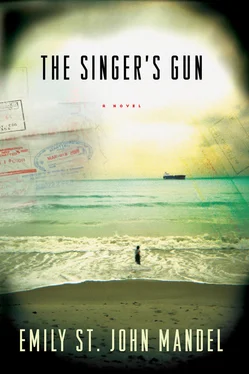They checked in and spent the day wandering the streets of Sant’Angelo, and Anton thought it was the most beautiful place he’d ever seen. The village allowed no cars and couldn’t have accomodated them; the streets rising up from the harbor were open-air corridors between the pale walls of villas, rough cobblestones turning every now and again into stairs. There were walled gardens glimpsed through iron gates, vines spilling over the tops of plaster walls. They turned a corner and the sea was brilliant far below them, bright-painted boats bobbing in the harbor waters. Three cafés competed on a large open piazza, and from the hillside above the harbor their umbrellas were sharp white circles and squares in the sunlight. Sophie and Anton ate dinner in the hotel restaurant and went to bed early, and in the morning they went down to the piazza and sat for a while reading the paper and drinking coffee together.
“You know,” Anton said, as casually as possible, “I was thinking about maybe staying on a while.”
She looked up from her café latte.
“Our plane tickets are for Thursday,” she said. “We have to go back to Rome tomorrow.”
“I was thinking if I stayed here for a little bit,” trying not to emphasize the I too cruelly, failing, “I could get some traction on my book. You know, really write for a while.”
“You’re writing a book?”
“It’s a new kind of travel book. I’ve been meaning to tell you about it. I just can’t get going with it at home,” he said, “but the atmosphere here. .”
“A new kind of travel book,” she repeated.
“‘We stand in need of something stronger now,’” he said. He was quoting a book review he’d read in the New York Times a while back, but he surmised from her baffled stare that she hadn’t read it. He pressed on regardless: “‘A travel book that you can read while making your way through this new, alarming world.’”
“That’s what you’re writing?”
“Well, I haven’t started yet. But here, you know, with no distractions. .”
“Well, if you can’t write it in New York City, Anton, you won’t be able to write it here either.”
“Bukowski,” he said. “I like that.”
“What?”
“Isn’t that what he said? Something about writing in the apocalypse with a cat clawing up your back? Anyway, I just think—”
“No, he said if you’re going to create, you’re going to create with a cat crawling up your back while the whole city trembles in earthquake, bombardment, flood, and fire.”
“Oh,” he said.
She regarded him silently.
“As I was saying. I just thought. . I just think it might be nice,” he said, “after all we’ve been through, you know, it’s been so intense with the wedding and everything, all the cancellations, I thought maybe we should be apart for a while. I mean, when I say a while, not a long while, just maybe a couple weeks. Sophie, please don’t cry.”
“I’m not crying.”
“You probably hate me,” he said. “Suggesting this on our honeymoon of all times.”
“No,” she said. She was digging in her purse.
“It’s okay, I’ll pay for your latte. Are you all right? Tell me honestly.”
“Fine,” she said absently, without looking up. Her handbag yielded a ferry schedule. She examined it for a moment, glanced at the antique gold wristwatch his parents had given her as an engagement gift, stood up from the table and started out of the piazza without looking at him. By the time he found a ten-euro bill in his wallet she was out of sight. He left the money on the table and ran after her, lunged through the door of the hotel and then realized at the bottom of the staircase that she hadn’t gone in. When he came back out into the sunlight, blinking, she was already halfway up the road that led out of the village. He caught up with her as she was getting into a taxi.
“Sophie, what are you doing?” He thought he’d never seen her so calm before and wondered if she somehow thrived on catastrophe.
She said something in Italian to the taxi driver, who nodded and started his engine. Somewhat at a loss, Anton climbed in beside her and closed the door.
“Sophie, come on, this is unnecessary. Your luggage. Your passport.”
“I carry my passport in my handbag,” she said, “and you can dispose of my luggage as you see fit.”
Sophie had nothing to say the rest of the way to the ferry terminal. He was on the shoreline side of the minivan; he stared out the window at the jumbled chaos of hotels and villas and the sea beyond, thinking of how beautiful the sea was and how much crassness and vulgarity lay between him and it. She had nothing to say at the ferry terminal either. She ducked away from his kiss and got on the ferry without speaking to him while he hung back uncertainly on the shore.
The way she departed: standing on the ferry moving away from him over the water toward the city of Naples, looking at him where he stood. She was half-smiling in a way that he felt was meant to convey something — sorrow, hope, reproach? — but he couldn’t bear it and so he turned away almost immediately, while her features and her half-smile were still clearly visible and the boat still loud in the water, and he realized later that this had been the moment when the cord had finally snapped between them.
He found himself repeating the motion at intervals in the weeks that followed, trying to recapture the clarity of that moment at the ferry terminal. Standing on the road near Sant’Angelo and looking out at the sea, for example, he would turn very slowly and deliberately away from the sunset, and he was invariably disappointed by the lack of finality in the movement.
For the first two weeks on Ischia he did very little. Once he had explained to the hotel owner that he planned on staying a few weeks or possibly longer and worked out an arrangement for the off-season—“You will help me watch the place, yes?” the hotel owner said — the question of what to do next hung overhead like a cartoon thundercloud. He was waiting for an event, and thoughts of it crowded out everything else. He had ideas about his travel book but was too distracted to write anything. The room was so small that he felt claustrophobic unless the doors to the balcony were open, but then the sea was too blue, the air was too bright, and before long he found himself down in one of the cafés on the piazza with a glass of coffee and the International Herald Tribune , reading and absorbing sunlight and doing the crossword puzzle and watching the boats. Anton had no books with him that he hadn’t already read, which was a problem, and there was an enormous amount of time to kill. He was startled by how much he missed his cat. He’d rescued Jim as a kitten two years earlier, and the cat had been an adoring orange one-eyed presence in Anton’s life ever since. He went for long walks up the stairs of the town, past houses and gardens terraced up the side of the hill, and spent hours sitting by the harbor at night. On clear nights Capri was a distant scattering of lights. He could see it from his room but preferred to be down by the harbor, where you could walk to a certain point at the edge of the piazza, turn away from Capri, and imagine that nothing stood between you and the north coast of Africa. He harbored vague notions of escaping to Tunisia.
“Are you having a nervous breakdown?” Gary asked, over a phone line crackly with enormous distance.
“No,” Anton said. He was leaning against a wall beside the pay phone in the Sant’Angelo piazza, looking out at the boats moving silently up and down in the harbor waves. Imagining the phone lines running under the Tyrrhenian Sea. The piazza was deserted. There were people inside a nearby café that was frequented mostly by fishermen, but the restaurants and shops were shuttered and dark. The wind off the water was cold.
Читать дальше





![Ричард Деминг - Whistle Past the Graveyard [= Give the Girl a Gun]](/books/412176/richard-deming-whistle-past-the-graveyard-give-t-thumb.webp)






